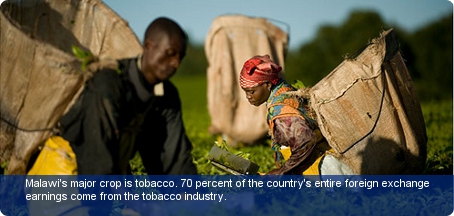Find a business in Malawi

Malawi has a low GNI per capita of US$320 (2012) and a GDP growth rate of 2.6% per annum (2008-12). Malawi is one of the world’s most densely populated and least developed countries. Its economy is predominately based on the agriculture sector but this has meant Malawi is vulnerable to subdued international demand or periods of drought. Its main agricultural export is tobacco and therefore global tobacco prices have a significant impact upon economic growth.
A positive performance from the tobacco sector is fundamental to short-term growth as this crop accounts for more than half of export earnings. The agriculture, forestry and fishery sector together contribute 30% of GDP (2010) and account for 90% of exports. The majority of the people farm on a small scale and there is a substantial commercial farming sector.
Manufacturing contributes 10% of GDP (2007), with most products being made for the domestic market. Growth in exports of manufactured products is constrained by the shortage of skilled workers, relatively low productivity, and very high transport costs.
Deposits of a large range of minerals have been found in Malawi. Mining of coal, lime (for construction), gemstones (rubies and sapphires) and heavy mineral sands has been on a small scale. But an Australian company, Paladin Resources, is developing a large uranium mine at Kayelekera in the north, while some 28 million tonnes of bauxite lying under Mount Mulanje in the south is now thought to be viable for exploitation. Total reserves of the several known coalfields are estimated at 20 million tonnes.
When Malawi became independent in 1964 it was one of the poorest and most underdeveloped countries in the world. The country’s continued dependence on agriculture with 85% of the population living in rural areas has contributed greatly to its vulnerability.
At present Malawi relies on substantial inflows of economic aid from the IMF, the World Bank, and individual donor nations. In 2006 Malawi was approved for relief under the Heavily Indebted Poor Countries (HIPC) programme. The government faces many challenges, including developing a market economy, improving educational facilities, facing up to environmental problems, dealing with the rapidly growing problem of HIV/AIDS, and satisfying foreign donors that fiscal discipline is being tightened.
As a landlocked country, Malawi’s only access to the sea is via neighbouring countries, the port of choice being Nacala in Mozambique to the east. Road and rail links through neighbouring countries are of vital importance to Malawi, which depends on foreign ports for most of its imports and exports. The road network extends to some 28,000 km, 19% of which is paved. Road improvement is a government priority and the World Bank has been assisting in road upgrading in recent years. There are two international airports.
Malawi is ranked as the fifth best country in Sub-Saharan Africa for paying taxes according to the World Bank’s ‘Doing Business 2012’ study. However, globally it is ranked 145th for the ease of doing business. These rankings measure the conduciveness of a regulatory regime in starting and operating a business.
Malawi has a 61.3% adult literacy rate (2010) and English is generally used in professional and business life. The majority of people live in rural areas and farming is the chief occupation.




